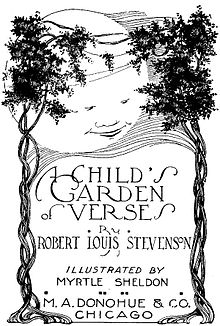M. A. Donohue & Co., was a publisher of children's books in the late 1800s and the first half of the 20th century. Established in Chicago, it had additional offices in New York City.
 A Child's Garden of Verses (1916) cover | |
| Status | Defunct |
|---|---|
| Founded | 1861 |
| Headquarters location | Chicago, Illinois |
| Publication types | Books |
| Fiction genres | children's literature |
According to the information compiled by Sid Huttner on The Lucile Project web pages:
M.A. Donohue & Co. based in Chicago, Illinois was established in 1861, initially known as Cox and Donohue, Bookbinders. The publisher's original location was 407-429 Dearborn St. in Chicago's South Loop. The company was known for inexpensive editions of popular works of fiction. It focused on publishing sets and series of books (i.e. "libraries.") Around 1880, the name of the company was changed to Donohue & Henneberry, and in 1901 to M. A. Donohue & Company. It continued in business to the 1960s at 711-727 S. Dearborn St., Chicago.[1]
Donohue Building
editThe Donohue Building is a historic 19th century building housing the Chicago printing company. It was designed by Julius B. Speyer (1845 - 1916)[2][3] and built in 1883. It was eventually converted for residential use. The building is on "Printer's Row" on South Dearborn Street.[4] It was the first large factory on Printing House Row. An annex was added on in 1913. In 1979 they became the first of Chicago's factory buildings to be converted to residential lofts. A historical marker for the building is at 712 South Dearborn.[5]
The masonry building design is described as Romanesque with a round arched sandstone and granite entry bay that was originally capped by a tower.[6]
The building has historic vault lights that are largely intact.[7]
For images of the former Donohue Building at 711-727 S. Dearborn St., see the Chicago - Architecture & Cityscape blog listed in the sources below.
References
edit- ^ Huttner, Sidney F. (2014). "M.A. Donohue". The Lucile Project. Retrieved May 22, 2024.
- ^ "Landmark Designation Report: Fulton-Randolph Market District" (PDF). City of Chicago. May 13, 2015. Retrieved May 22, 2024.
- ^ "Old Town Triangle District Commercial Building Historic Context Statement" (PDF). oldtowntriangle.com. Archived from the original (PDF) on June 14, 2020.
- ^ "Donohue & Henneberry". chicagology.com. Retrieved May 22, 2024.
- ^ "The Donohue Building Historical Marker". Historical Marker Database. Retrieved May 22, 2024.
- ^ American Institute of Architects Chicago (May 15, 2014). AIA Guide to Chicago. University of Illinois Press. ISBN 9780252096136 – via Google Books.
- ^ "19th century cast iron sidewalk and stoop vault lights have all but vanished in chicago". Urban Remains. November 1, 2018. Archived from the original on June 14, 2020.
Additional sources
editLucile Project web pages:
- M.A. Donohue & Co.Chicago, 1901-
- Donohue & Henneberry (Donohue, Henneberry & Co.) Chicago, 1871-1899
Chicago - Architecture & Cityscape: